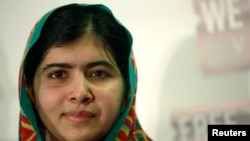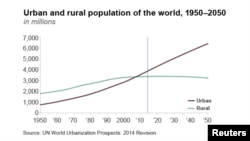The United Nations warns that governments are ignoring the voices of young people and excluding them from important policy decisions at their peril. As nations mark World Population Day on July 11, the U.N. Population Fund says investing in the well-being of adolescents and young people benefits communities throughout the world.
Young people comprise nearly two billion of the more than seven billion people who now live on this Earth. Such a large number of people is a powerful force and cannot easily be ignored. Nevertheless, adolescents and young people are marginalized and subject to some of the worst violations and deprivations in many countries.
The U.N. Population Fund reports an estimated 515 million adolescents and youth aged 15 to 24 live on less than $2 a day. But despite the numbers it notes two out of three countries do not consult young people on key policy decisions that affect their lives.
The agency says young people face many challenges, especially in poor developing countries in Africa and Asia, where the young population is huge. Obstetrician and senior advisor for maternal health at UNFPA Luc de Bernis said millions of young people who enter puberty are faced with physical changes and become vulnerable to human rights abuses as well.
“This is particularly important where the youth and adolescent, particularly girls are facing high risks-risks of coerced sex and, we know that 10 percent of the young girls, which started the intercourse experiences before 16-it is due to coerced sex and this is leading to complications to early pregnancy, to abortions,” said de Bernis.
Globally, U.N. statistics find, more than 15 million girls aged 15 to 19 give birth every year. The U.N. says early marriages, early pregnancies and births account for the high percentage of maternal deaths in developing countries.
In addition, studies show more than two million adolescents between the ages of 10 and 19 are living with HIV, a disease linked to coerced sex in such cases.
De Bernis told VOA it is tragic that young girls are forced to face so many unacceptable risks.
“It took me years working in developing countries to understand, to realize that when you are a small girl, a young girl, you have no place where you can be safe. You cannot be safe very often in the family, unfortunately. You cannot be safe in the street. You cannot be safe at school when girls are not respected, when there is no toilet, where there is no space and where the violence is,” said de Bernis.
De Bernis said healthy, educated, productive young people can help break the cycle of intergenerational poverty and can contribute to their communities and nations. He said UNFPA is working with governments and with civil society to promote comprehensive sexuality education as well as quality sexual and reproductive health services.
He also said the agency is working with traditional leaders to try to change their perception of young people and to get their support in banning early marriage and improving young lives.
He thinks the old adage that “children should be seen and not heard” is twisted. On the contrary, he said, governments would do well to listen to the voices of young people, to respect them and to realize how all can benefit from the contributions youths can make to their country’s development.









